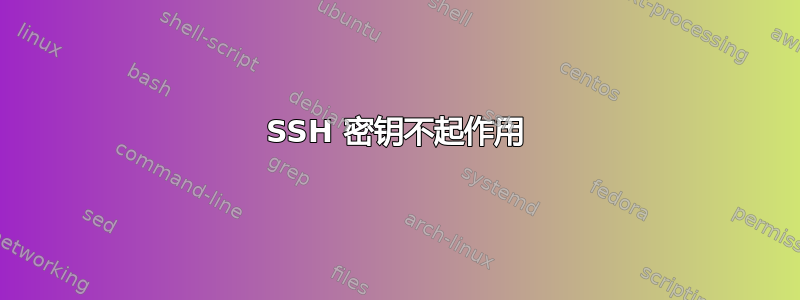
我在我的笔记本电脑上创建了一个 SSH 密钥ssh-keygen,然后将其放在一些生产服务器上,这样我就不必每次都输入密码。
在某些服务器上它运行良好,但在某些服务器上它仍然要求我输入密码。这是为什么?即使.ssh/*权限是针对用户的。
PubkeyAuth 设置为“是”:
RSAAuthentication yes
PubkeyAuthentication yes
AuthorizedKeysFile .ssh/authorized_keys
ssh -vv 输出:
OpenSSH_5.9p1 Debian-5ubuntu1.1, OpenSSL 1.0.1 14 Mar 2012
debug1: Reading configuration data /etc/ssh/ssh_config
debug1: /etc/ssh/ssh_config line 19: Applying options for *
debug2: ssh_connect: needpriv 0
debug1: Connecting to xxx.xxx.xxx.xxx [xxx.xxx.xxx.xxx] port 22.
debug1: Connection established.
debug1: identity file /home/omipenguin/.ssh/id_rsa type 1
debug1: Checking blacklist file /usr/share/ssh/blacklist.RSA-2048
debug1: Checking blacklist file /etc/ssh/blacklist.RSA-2048
debug1: identity file /home/omipenguin/.ssh/id_rsa-cert type -1
debug1: identity file /home/omipenguin/.ssh/id_dsa type -1
debug1: identity file /home/omipenguin/.ssh/id_dsa-cert type -1
debug1: identity file /home/omipenguin/.ssh/id_ecdsa type -1
debug1: identity file /home/omipenguin/.ssh/id_ecdsa-cert type -1
debug1: Remote protocol version 2.0, remote software version OpenSSH_4.3
debug1: match: OpenSSH_4.3 pat OpenSSH_4*
debug1: Enabling compatibility mode for protocol 2.0
debug1: Local version string SSH-2.0-OpenSSH_5.9p1 Debian-5ubuntu1.1
debug2: fd 3 setting O_NONBLOCK
debug1: SSH2_MSG_KEXINIT sent
debug1: SSH2_MSG_KEXINIT received
debug2: kex_parse_kexinit: ecdh-sha2-nistp256,ecdh-sha2-nistp384,ecdh-sha2-nistp521,diffie-hellman-group-exchange-sha256,diffie-hellman-group-exchange-sha1,diffie-hellman-group14-sha1,diffie-hellman-group1-sha1
debug2: kex_parse_kexinit: [email protected],[email protected],ssh-rsa,[email protected],[email protected],[email protected],[email protected],[email protected],ecdsa-sha2-nistp256,ecdsa-sha2-nistp384,ecdsa-sha2-nistp521,ssh-dss
debug2: kex_parse_kexinit: aes128-ctr,aes192-ctr,aes256-ctr,arcfour256,arcfour128,aes128-cbc,3des-cbc,blowfish-cbc,cast128-cbc,aes192-cbc,aes256-cbc,arcfour,[email protected]
debug2: kex_parse_kexinit: aes128-ctr,aes192-ctr,aes256-ctr,arcfour256,arcfour128,aes128-cbc,3des-cbc,blowfish-cbc,cast128-cbc,aes192-cbc,aes256-cbc,arcfour,[email protected]
debug2: kex_parse_kexinit: hmac-md5,hmac-sha1,[email protected],hmac-sha2-256,hmac-sha2-256-96,hmac-sha2-512,hmac-sha2-512-96,hmac-ripemd160,[email protected],hmac-sha1-96,hmac-md5-96
debug2: kex_parse_kexinit: hmac-md5,hmac-sha1,[email protected],hmac-sha2-256,hmac-sha2-256-96,hmac-sha2-512,hmac-sha2-512-96,hmac-ripemd160,[email protected],hmac-sha1-96,hmac-md5-96
debug2: kex_parse_kexinit: none,[email protected],zlib
debug2: kex_parse_kexinit: none,[email protected],zlib
debug2: kex_parse_kexinit:
debug2: kex_parse_kexinit:
debug2: kex_parse_kexinit: first_kex_follows 0
debug2: kex_parse_kexinit: reserved 0
debug2: kex_parse_kexinit: diffie-hellman-group-exchange-sha1,diffie-hellman-group14-sha1,diffie-hellman-group1-sha1
debug2: kex_parse_kexinit: ssh-rsa,ssh-dss
debug2: kex_parse_kexinit: aes128-cbc,3des-cbc,blowfish-cbc,cast128-cbc,arcfour128,arcfour256,arcfour,aes192-cbc,aes256-cbc,[email protected],aes128-ctr,aes192-ctr,aes256-ctr
debug2: kex_parse_kexinit: aes128-cbc,3des-cbc,blowfish-cbc,cast128-cbc,arcfour128,arcfour256,arcfour,aes192-cbc,aes256-cbc,[email protected],aes128-ctr,aes192-ctr,aes256-ctr
debug2: kex_parse_kexinit: hmac-md5,hmac-sha1,hmac-ripemd160,[email protected],hmac-sha1-96,hmac-md5-96
debug2: kex_parse_kexinit: hmac-md5,hmac-sha1,hmac-ripemd160,[email protected],hmac-sha1-96,hmac-md5-96
debug2: kex_parse_kexinit: none,[email protected]
debug2: kex_parse_kexinit: none,[email protected]
debug2: kex_parse_kexinit:
debug2: kex_parse_kexinit:
debug2: kex_parse_kexinit: first_kex_follows 0
debug2: kex_parse_kexinit: reserved 0
debug2: mac_setup: found hmac-md5
debug1: kex: server->client aes128-ctr hmac-md5 none
debug2: mac_setup: found hmac-md5
debug1: kex: client->server aes128-ctr hmac-md5 none
debug1: SSH2_MSG_KEX_DH_GEX_REQUEST(1024<1024<8192) sent
debug1: expecting SSH2_MSG_KEX_DH_GEX_GROUP
debug2: dh_gen_key: priv key bits set: 121/256
debug2: bits set: 527/1024
debug1: SSH2_MSG_KEX_DH_GEX_INIT sent
debug1: expecting SSH2_MSG_KEX_DH_GEX_REPLY
debug1: Server host key: RSA d2:5c:eb:cf:9a:55:85:ce:a1:00:71:c8:92:bb:25:fb
debug1: Host 'xxx.xxx.xxx.xxx' is known and matches the RSA host key.
debug1: Found key in /home/omipenguin/.ssh/known_hosts:14
debug2: bits set: 540/1024
debug1: ssh_rsa_verify: signature correct
debug2: kex_derive_keys
debug2: set_newkeys: mode 1
debug1: SSH2_MSG_NEWKEYS sent
debug1: expecting SSH2_MSG_NEWKEYS
debug2: set_newkeys: mode 0
debug1: SSH2_MSG_NEWKEYS received
debug1: Roaming not allowed by server
debug1: SSH2_MSG_SERVICE_REQUEST sent
debug2: service_accept: ssh-userauth
debug1: SSH2_MSG_SERVICE_ACCEPT received
debug2: key: /home/omipenguin/.ssh/id_rsa (0x7fe924a9f3f0)
debug2: key: /home/omipenguin/.ssh/id_dsa ((nil))
debug2: key: /home/omipenguin/.ssh/id_ecdsa ((nil))
debug1: Authentications that can continue: publickey,password
debug1: Next authentication method: publickey
debug1: Offering RSA public key: /home/omipenguin/.ssh/id_rsa
debug2: we sent a publickey packet, wait for reply
debug1: Authentications that can continue: publickey,password
debug1: Trying private key: /home/omipenguin/.ssh/id_dsa
debug1: Trying private key: /home/omipenguin/.ssh/id_ecdsa
debug2: we did not send a packet, disable method
debug1: Next authentication method: password
文件和目录权限:
drwxrwxr-x 2 emerg wheel 4096 Apr 10 11:51 .ssh/
-rw-r--r-- 1 emerg emerg 403 Apr 10 11:51 .ssh/authorized_keys
答案1
这是罪魁祸首:
drwxrwxr-x 2 emerg wheel 4096 Apr 10 11:51 .ssh/
您允许组中的任何人wheel对您的目录进行写访问.ssh。这意味着该组的任何成员都可以替换您的authorized_keys文件 - 因此 SSH 拒绝信任该文件。
修复您的权限,问题就会消失。
答案2
@Jenny D 的回答的补充,来自man ssh:
~/.ssh/
This directory is the default location for all user-specific con‐
figuration and authentication information. There is no general
requirement to keep the entire contents of this directory secret,
but the recommended permissions are read/write/execute for the
user, and not accessible by others.
~/.ssh/id_rsa
Contains the private key for authentication. These files contain
sensitive data and should be readable by the user but not acces‐
sible by others (read/write/execute). ssh will simply ignore a
private key file if it is accessible by others. It is possible
to specify a passphrase when generating the key which will be
used to encrypt the sensitive part of this file using 3DES.
我认为 的权限.ssh是原来的“免费”,但它受到私钥文件权限的限制,所以你不能给.ssh组或其他人写权限。


